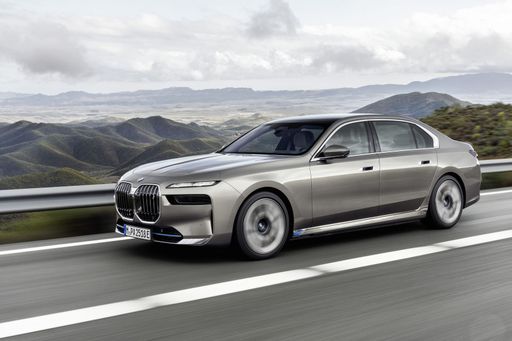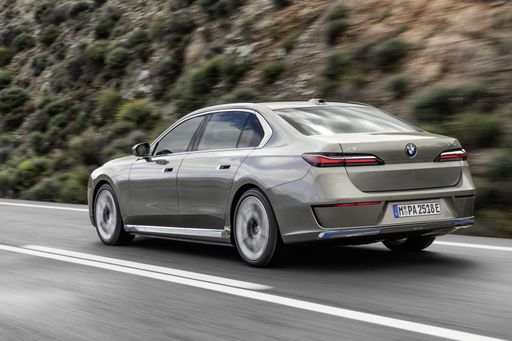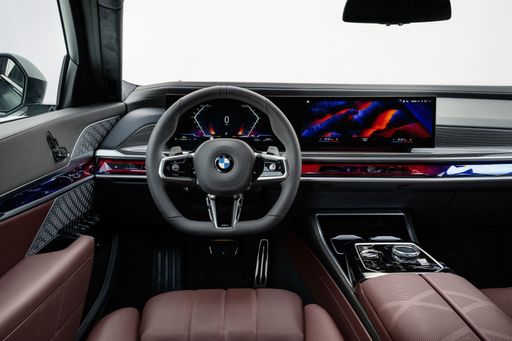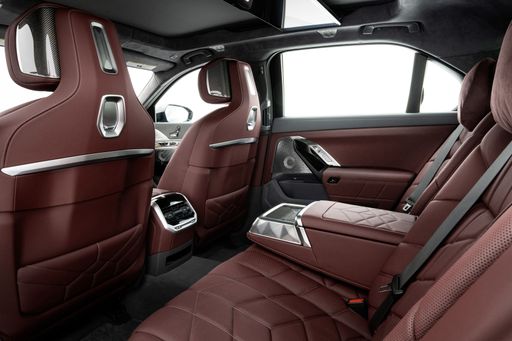BMW i7 VS Toyota Proace Max
BMW i7
The new BMW i7 epitomises luxury and innovation, seamlessly blending advanced technology with elegant design. Its interior offers an unparalleled experience, with premium materials and cutting-edge features that create a tranquil yet engaging atmosphere for both driver and passengers. The i7's performance is both dynamic and efficient, demonstrating BMW's commitment to sustainable driving without compromising on the exhilarating drive the brand is known for.
more informationToyota Proace Max
The Toyota Proace Max is a versatile vehicle that seamlessly combines functionality with style. Its spacious interior is designed to accommodate both passengers and cargo comfortably, making it an ideal choice for families and businesses alike. With a sleek exterior and a range of advanced features, the Proace Max stands out in its class, offering a reliable and efficient driving experience.
more information @ press.bmwgroup.com
@ press.bmwgroup.com
 @ press.bmwgroup.com
@ press.bmwgroup.com
 @ press.bmwgroup.com
@ press.bmwgroup.com
 @ press.bmwgroup.com
@ press.bmwgroup.com
Costs and Consumption |
|
|---|---|
|
Price
about 106900 - 168100
$
|
Price
about 38300 - 55000
$
|
|
Consumption L/100km
-
|
Consumption L/100km
7.5 - 8.7
L
|
|
Consumption kWh/100km
18.5 - 20.8
kWh
|
Consumption kWh/100km
-
|
|
Electric Range
559 - 623
km
|
Electric Range
-
|
|
Battery Capacity
101.7
kWh
|
Battery Capacity
-
|
|
co2
0
g/km
|
co2
198 - 229
g/km
|
|
Fuel tank capacity
-
|
Fuel tank capacity
69
L
|
Dimensions and Body |
|
|
Body Type
Sedan
|
Body Type
Cargo Van
|
|
Seats
5
|
Seats
2 - 6
|
|
Doors
4
|
Doors
4 - 5
|
|
Curb weight
2595 - 2770
kg
|
Curb weight
2000 - 2358
kg
|
|
Trunk capacity
500
L
|
Trunk capacity
-
|
|
Length
5391
mm
|
Length
5413 - 6363
mm
|
|
Width
1950
mm
|
Width
2050
mm
|
|
Height
1544
mm
|
Height
2254 - 2764
mm
|
|
Payload
480 - 535
kg
|
Payload
1142 - 1475
kg
|
Engine and Performance |
|
|
Engine Type
Electric
|
Engine Type
Diesel
|
|
Transmission
Automatic
|
Transmission
Manuel, Automatic
|
|
Transmission Detail
Reduction Gearbox
|
Transmission Detail
Manual Gearbox, Automatic Gearbox
|
|
Drive Type
Rear-Wheel Drive, All-Wheel Drive
|
Drive Type
Front-Wheel Drive
|
|
Power HP
455 - 660
HP
|
Power HP
120 - 180
HP
|
|
Acceleration 0-100km/h
3.7 - 5.5
s
|
Acceleration 0-100km/h
-
|
|
Max Speed
205 - 250
km/h
|
Max Speed
-
|
|
Torque
650 - 1100
Nm
|
Torque
-
|
|
Number of Cylinders
-
|
Number of Cylinders
4
|
|
Power kW
335 - 485
kW
|
Power kW
88 - 132
kW
|
|
Engine capacity
-
|
Engine capacity
2184
cm3
|
|
Top speed
205 - 250
km/h
|
Top speed
-
|
General |
|
|
Model Year
2022 - 2023
|
Model Year
2024
|
|
CO2 Efficiency Class
A
|
CO2 Efficiency Class
G
|
|
Brand
BMW
|
Brand
Toyota
|
BMW i7
The Pinnacle of Electric Luxury: BMW i7
Introducing the BMW i7, the latest in electric innovation from one of the world's premier automobile manufacturers. Blending cutting-edge technology with luxurious comfort, the i7 represents a significant leap forward in the electric vehicle (EV) market. This article delves into the technical specifications and innovative features that set the BMW i7 apart from its competitors.
Powerful Electric Performance
Under the sleek exterior of the BMW i7 lies a powerhouse of electric capabilities. Depending on the model configuration, the i7 offers between 455 and 660 PS, with a torque of up to 1100 Nm. This ensures an exhilarating driving experience, whether you choose the rear-wheel drive or all-wheel drive configuration. The acceleration is equally impressive, with the i7 capable of going from 0 to 100 km/h in just 3.7 to 5.5 seconds.
Efficient Energy Consumption
The efficiency of the BMW i7 is noteworthy, with an energy consumption ranging from 18.5 to 20.8 kWh/100 km. This efficiency, combined with a substantial battery capacity of 101.7 kWh, gives the i7 an electric range of between 559 and 623 kilometres. BMW’s commitment to sustainability is further underscored by its zero CO2 emissions, reinforcing its status as a premium yet environmentally conscious choice.
Sophisticated Interior and Technology
Inside, the BMW i7 is the epitome of luxury. With seating for five, the interior exudes elegance and comfort. Advanced technology is at your fingertips with features such as the latest iDrive system, providing seamless connectivity and enhanced control over vehicle functions. The i7 ensures you travel in style with its sophisticated Design Pure Excellence, M Sport package, and M Sport package Pro interior trims.
Dimensions and Capacity
The i7’s ample dimensions – with a length of 5391 mm, width of 1950 mm, and height of 1544 mm – are matched by its generous luggage capacity of 500 litres, ensuring practicality alongside luxury. The car's robust build is complemented by a payload capacity of between 480 to 535 kg, ensuring the i7 is as functional as it is stylish.
Cost and Efficiency
With prices ranging from €115,700 to €181,800, the i7 is positioned as a high-end vehicle offering value through its advanced features and performance. The monthly operating costs range between €2,143 and €3,027, while the cost per kilometre is approximately 85.7 to 121.1 cents. Despite its upscale market positioning, the i7 offers competitive efficiency with its remarkable CO2 emission-free driving and energy-saving technologies.
Conclusion
The BMW i7 stands as a testament to the brand’s innovation and dedication to sustainable luxury. By marrying performance, efficiency, and cutting-edge technology, BMW has ensured that the i7 not only meets but exceeds the expectations of discerning EV enthusiasts. The i7 is not merely a car; it is a statement of intent in the future of sustainable luxury. Experience the future today with the BMW i7.
Toyota Proace Max
Introducing the Toyota Proace Max: A Versatile Powerhouse
The Toyota Proace Max is a transport vehicle designed for those who need both muscle and adaptability in their daily operations. As a strong contender in the world of vans, the Proace Max impresses with a range of configurations and specifications tailored to meet commercial needs across different sectors.
Technical Excellence and Versatility
Underneath its robust exterior, the Toyota Proace Max boasts a 2.2-litre diesel engine that provides a commendable range of power outputs from 120 to 180 PS. The versatility of this van is further expanded by the choice between manual and automatic transmissions, ensuring a smooth ride no matter the conditions or preferences of the driver.
With front-wheel drive, the Proace Max delivers reliable traction and handling, even when tackling the tougher terrains. Its carbon dioxide emissions, ranging from 198 to 229 g/km, are a testament to Toyota’s ongoing commitment to balancing performance with environmental responsibility.
Innovative Design and Features
Designed with practicality and functionality in mind, the Proace Max satisfies with a payload capacity of between 1,142 kg and 1,475 kg. This, paired with its generous interior space, makes it ideal for transporting goods, equipment, or personnel.
The van offers several trim levels including Meister, Select, and with an automatic option in Meister and Comfort, all of which provide differing levels of equipment to cater for a wide range of business needs. This ensures that the Proace Max is adaptable, able to transition from a simple workhorse to a more comfortable, feature-rich transport solution with ease.
Fuel Efficiency and Environmental Considerations
The Proace Max manages an impressive fuel consumption rate between 7.5 and 8.7 L/100km, proving economical over longer distances. Its CO2 efficiency class rating of G reflects the necessity for optimum performance balanced with environmental considerations.
This balance of power and efficiency positions the Proace Max as a formidable competitor in its segment, providing a dependable and efficient solution for businesses concerned with both operational costs and environmental impact.
Spacious and Customisable Interior
Inside, the Proace Max accommodates between 2 to 6 seats, depending on the chosen configuration, making it suitable for varying needs whether for transporting crew or cargo. Its dimensions, with a length of up to 6,363 mm and height variants that reach up to 2,764 mm, ensure maximum capacity and flexibility.
For companies that require adaptable transport solutions, the Proace Max allows for significant customisation potential, ensuring the vehicle can be tailored to suit precise requirements.
Conclusion: The Ideal Workhorse
Priced between €41,472 and €64,629, the Toyota Proace Max ensures businesses can invest in a robust, innovative, and flexible transport solution without compromising on capability or efficiency. Designed to meet the demands of various commercial tasks, the Proace Max solidifies its position in the market with its innovative features, versatility, and outstanding performance.
